NOVEMBER 18, 2020
CANADIANS HAVE A COMPLICATED relationship with American presidential politics. The theatrics we are used to seeing south of the border, fuelled by cable television and deep-pocketed political action committees, have captured our attention the same way we are attracted to sporting events and live music.
But for Canadian businesses, the results are not a game. There are very few countries more dependent on a single trading partner than Canada is to the United States. When our trade relationship works, we are not just exchanging goods, but building things together. Canadian cultural institutions are shaped by alignment with, or occasionally resistance to, movements to the south. And our political leaders are constantly analyzing and responding to their U.S. counterparts.
Pierre Trudeau, Canada’s 15th prime minister, famously referred to Canada’s relationship with the U.S. as akin to “sleeping with an elephant” that affects its neighbour with “every twitch and grunt.” While the former prime minister’s words have been repeated frequently enough to become tiresome, their implications following the United States’ 59th presidential election are less than clear.
President Donald Trump’s 2016 election, and the ascension of populist conservative politics in the U.S., created an instant paradigm shift for the Canadian business community. Consensuses around trade, multilateral co-operation and environmental sustainability were flipped on their head overnight.
Four years later, the U.S. has moved in a different direction, but we’re still studying what this means. Subject to any outstanding legal challenges, a Biden presidency is a win for progressives and centrists in the U.S., as well as international allies that support a return of the U.S. to an aspirational leadership role.
But Trump’s brand of politics remains formidable. With a possibly Republican Senate and conservative-leaning Supreme Court, the ability of a Biden-Harris administration to simply flick a switch and revert to normal is not a given. In this sense, it feels less like we are sleeping with an elephant and more like we are sleeping with a chameleon, still looking at different angles to understand its true colours.
For Canadian businesses, this will take time, but there are lessons to be learned from policy pronouncements made on the campaign trail, the role that social media played in shaping the outcome, and the mandates that elected representatives at the legislative and executive level bring with them.
Navigator colleagues from across the country have analyzed these lessons and outlined five stories that matter for Canadian businesses.
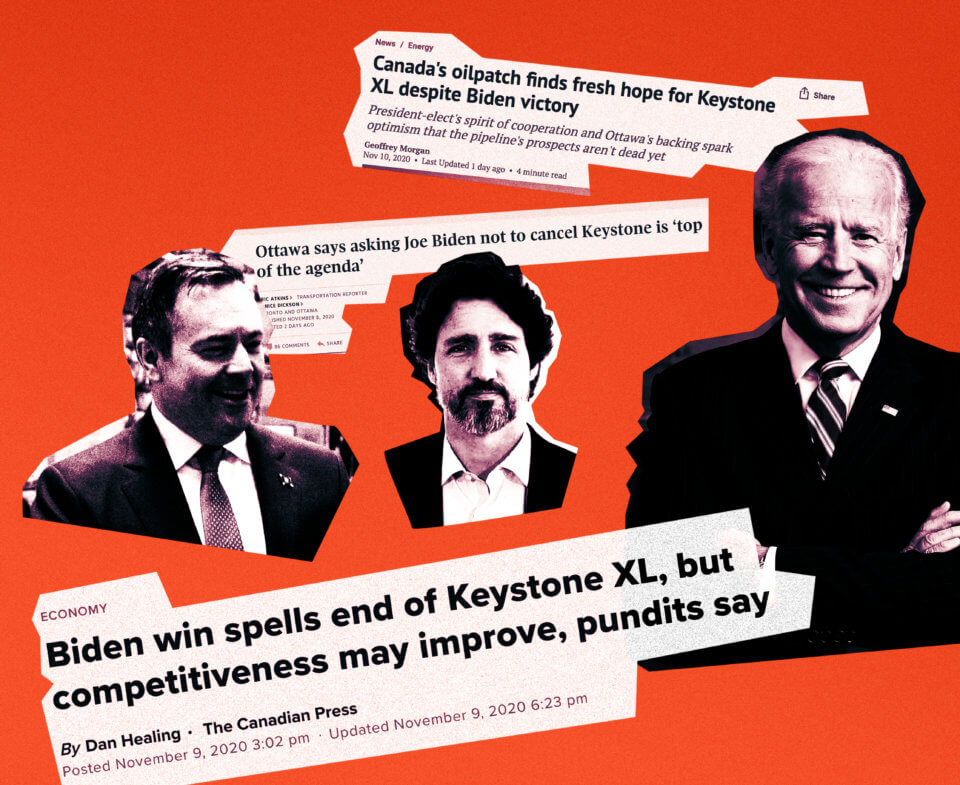
FINDING COMMON GROUND ON ENERGY
Zoe Keirstead, Consultant, Calgary
FOR CANADA’S ENERGY INDUSTRY, a sector battling the triple threat of the pandemic, dramatic demand destruction and a commodity price war, a presumptive Joe Biden presidency presents new challenges. However, the change in the White House is also a new opportunity to build relationships and foster a sense of bilateral collaboration.
What the oil and gas industry, Alberta Premier Jason Kenney, Prime Minister Justin Trudeau, and president-elect Joe Biden share is an understanding that they must work together to combat climate change while simultaneously preserving the economic benefits the energy sector can provide. As both Canada and the U.S. know, the oil and gas industry impacts everyone, not only from an economic standpoint but in terms of quality of life. Canada is not immune to divisive politics, but in the oil and gas sector we have seen a promising shift towards an understanding of working together.
“Canada is not immune to divisive politics, but in the oil and gas sector we have seen a promising shift towards an understanding of working together.”
Kenney and Trudeau may disagree on many policies, but the need to get Canadian resources to market through the Keystone XL pipeline is not one of them. Earlier this year they each made bold statements: Kenney invested $1.5 billion, while Trudeau declared he would press any U.S. government on the construction of the pipeline.
Canada and the U.S. have important shared priorities, such as creating a cleaner environment, social equality, diversity, inclusion and democratic governance. These common values are embraced by the oil and gas industry within North America, but are not shared with other oil- producing nations such as Venezuela, Russia and Saudi Arabia.
North America’s integrated energy market is the most ethical and environmentally responsible in the world. Any disruptions would have impacts on both sides of the border. To protect North America’s energy security and to continue receiving essential oil and gas products from an ethical source, there must be a safe and reliable transportation infrastructure. Biden has said he would kill the pipeline project as part of his plans to advance energy transition and broader climate change objectives, but he will also need to balance energy security, the need for jobs and a strong economy in a post-pandemic world.
The relationship between Canada and the U.S. has been through many challenges, such as the tough renegotiations of the North America Free Trade Agreement (NAFTA) that led to the United States-Mexico-Canada Agreement (USMCA). The level of care that was taken to represent Canada during those negotiations must be replicated to ensure vital economic projects like Keystone XL can succeed.
Canada and the U.S. have an opportunity to work with the oil and gas industry to build energy security across our nations while tackling climate change in ways that countries like Russia and Saudi Arabia will not.
Our countries share a unique and storied relationship, forged by shared geography, economic ties and deep personal connections. The future of this relationship can and must be fuelled by an integrated energy market.
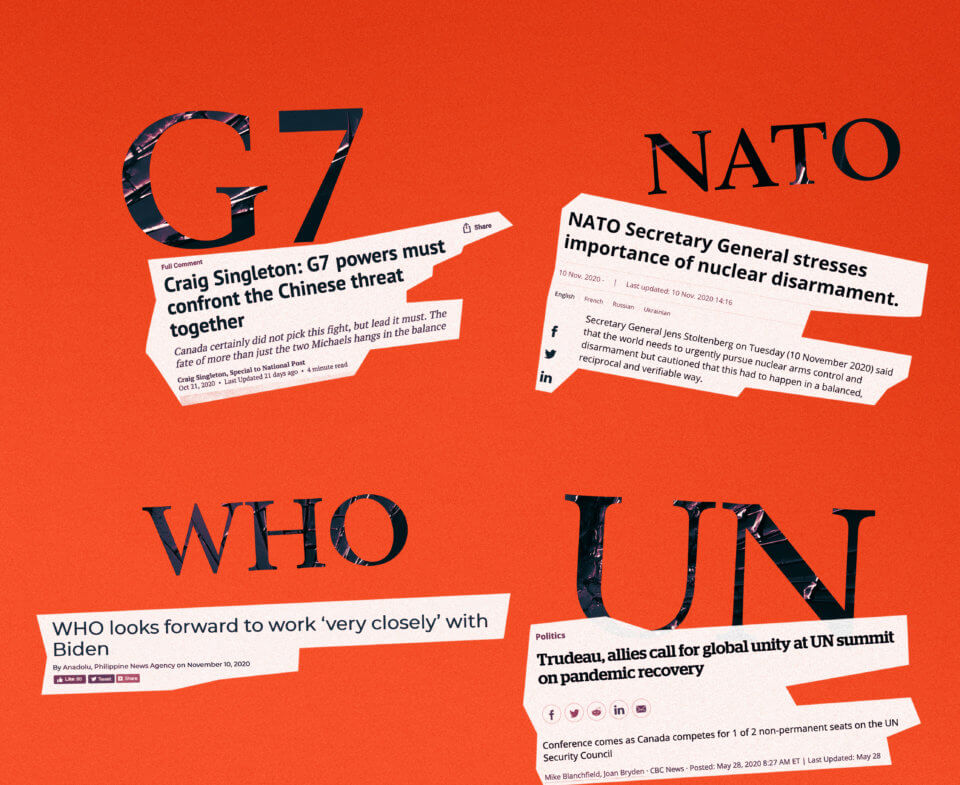
LEADERSHIP MATTERS
Philippe Gervais, Managing Principal, Montreal
SINCE THE SECOND WORLD WAR, the person occupying the Oval Office has been referred to as the “leader of the free world” with reason. Whether it was at a G7, NATO or UN meeting, the president of the United States, whether Democrat or Republican, was the person leading large coalitions of democratic countries across the globe. Since the end of the Cold War, the power conveyed by the occupant of the Oval Office diminished somewhat, but was never so undermined as under President Donald Trump. His lack of respect and consideration for historical allies, and his bullying, win-lose approach to every issue, have created long-term damage internationally.
The popularity and respect the U.S. president has been able to wield in foreign countries have been key to successful worldwide outcomes. Would Trump have been able to deploy short-range nuclear weapons in Germany and the U.K. as Reagan did in the 1980s, which helped bring the Soviet Union to its knees? Could he have mobilized the coalition that went to war in the Middle East against Iraq as Bush did? Could he have steered the world through the vast economic reforms of the 1970s, ’80s and ’90s that have created today’s global economy? The president’s political power and ability to convince and influence citizens both inside and outside the U.S. was lost in the last four years, and that created an important void.
Biden will be a godsend for Canada-U.S. relations after four years of unpredictability, misinformation and disrespect. From an almost continuously empty chair at the U.S. Embassy in Ottawa (during more than half the Trump mandate), to spending only a few hours at a G7 meeting in Canada (Charlevoix 2018), Canada has never been treated so badly by a president. Can we expect the bromance of Trudeau-Obama or the Irish duets of Mulroney-Reagan? Time will tell, but most Canadians would settle for a normal relationship.
“There are no overnight solutions to the problems businesses and governments face together — from climate change, to income inequality, to the global pandemic — but Canadians can take comfort in the fact that an experienced, influential presence will be returning to the table.”
Of course, normal does not mean an absence of issues between our two countries. Keystone XL, softwood lumber and an expected, more protectionist “Buy American” positioning will be sticking points with the new administration. For Canadians, on the other hand, simply working with a president who approaches issues based on facts and political realities, and who seeks a win-win outcome, means we have a better chance of resolving our issues.
Building coalitions, working with allies and finding common ground are the anticipated cornerstones of the Biden administration’s approach. The president-elect has clearly demonstrated his desire to recapture the traditional role of the presidency on the world stage and once again take on the role of leader of the free world. This bodes well for many international organizations where the U.S. will once again play a leadership role in finding solutions instead of blocking progress. It also bodes well for Canadian businesses that have seen their key trading relationship clouded by uncertainty in recent years.
Everything about the U.S. is big — its military might, its economy and its production of greenhouse gases, which makes it a necessary voice at the head of the table of international institutions. World organizations and groups such as the suddenly all-important WHO, NATO, WTO and G7 have everything to gain with an engaged, reliable U.S. president.
There are no overnight solutions to the problems businesses and governments face together — from climate change, to income inequality, to the global pandemic — but Canadians can take comfort in the fact that an experienced, influential presence will be returning to the table.
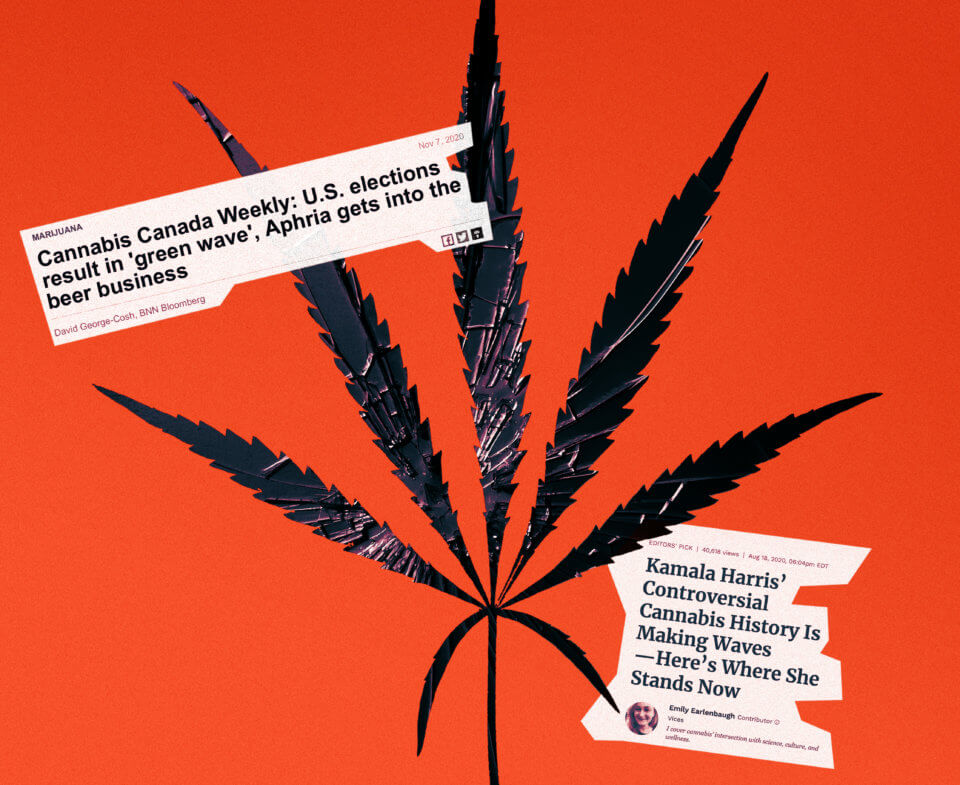
HIGH TIMES ON THE HORIZON?
Jenessa Crognali, Senior Consultant, Toronto
WHILE CANADA’S NATIONAL LEGALIZATION framework gave Canadian cannabis operators a first- mover advantage in 2018, our largest producers have their eyes on both sides of the border. Canadian companies like Aurora Cannabis and Canopy Growth are listed on U.S. stock indexes and have publicly communicated their U.S. growth strategies.
Restrictions on interstate commerce and access to financial services have limited the industry’s U.S. potential, but the election results have helped it inch forward. Days before Americans knew who their president-elect would be, five U.S. states approved cannabis-related ballot measures. Arizona, Montana, New Jersey and South Dakota are set to legalize recreational cannabis, while South Dakota and Mississippi are also set to approve medical use.
This is welcome news for a beleaguered Canadian industry that has seen its stock valuations plummet over the past 18 months. With this momentum, it may be tempting to think a Democratic president will advance cannabis policy enough to kick-start a renaissance here in Canada, but expectations should be tempered.
“We will decriminalize marijuana and we will expunge the records of those who have been convicted of marijuana,” declared Biden’s running mate and now vice-president-elect, Kamala Harris, on the campaign trail. Indeed, this is a promise baked into the Democratic Party’s 2020 election platform and congressional Democratic leadership is largely unified in its support on the issue of cannabis reform.
Biden, a former soldier in the war on drugs, has publicly endorsed reforms that prioritize decriminalization and a reasoned pathway for future legalization by granting states the authority to make their own decisions on the matter. A wrinkle for the Biden administration on this file will be the potential continuation of a Republican Senate majority and the GOP’s hesitance to support any legislation that might be claimed as a victory by a Democratic administration.
“A Biden administration provides a glimmer of hope, rather than a silver bullet, for Canadian cannabis companies holding out for American partnerships and market opportunities.”
While Canadian cannabis companies are listed on U.S. stock exchanges, they have had to focus on hemp-based CBD products because cannabis remains illegal federally. If this changes, it will open a new and relatively untapped market for the Canadian industry.
While federal legalization may be a distant aspiration, more immediate measures like the U.S. SAFE Banking Act, which would allow financial institutions to work with cannabis companies without retribution, or potential steps to expand research access to the plant, are more immediate goals the industry should rally around.
Like most policy areas impacted by the U.S. election, the future of a cross-border cannabis industry remains highly uncertain. A Biden administration provides a glimmer of hope, rather than a silver bullet, for Canadian cannabis companies holding out for American partnerships and market opportunities. Until then, the search for high times continues.
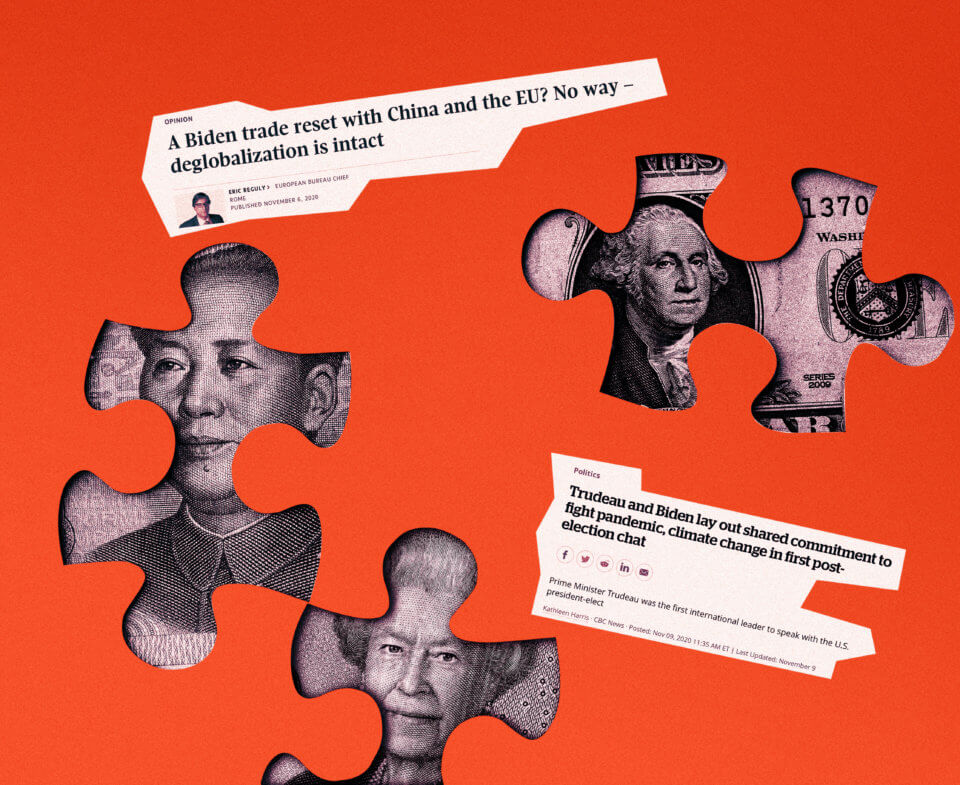
AMERICA: FIRST AMONG ALLIES
Michael Stock, Consultant, Toronto
FOR ALL THE VAGARIES AND INCONSISTENCIES of Trumpism, one consistent cornerstone of the Trump presidency was a hawkish attitude toward China. Over the past four years, the president has drawn the two superpowers into a dance of bluster and economic retaliation for what he sees as the systemic and long-standing imbalance in their relationship.
Trump’s trade war has been characterized by aggressive tariffs and complemented by an unrelenting use of China as a scapegoat for the ills of America’s working-class and blue-collar communities. It has also, on its own terms, failed. America’s trade deficit has grown under Trump’s watch and the chill in relations has taken a toll on the American economy while China’s continues to chug along.
But Trump’s stance on China has always been more about posture than policy, and tariffs are simply the president’s wildly expensive version of a slap on the wrist for bad behaviour. While many expect a Biden administration to be less aggressive in its use of economic leverage to punish President Xi Jinping and the Chinese Communist Party, we shouldn’t expect a total reset in relations — political or economic — anytime soon.
The reality is that one of the few positions on which Americans agree, especially since the COVID-19 pandemic began, is that China cannot be trusted and must be reined in. Biden will not lose out on the opportunity for an easy foreign policy stance that, unlike EU trade or relations with Israel, can unify, rather than enflame, the nation.
So, what can Canadian businesses expect from a Biden presidency when it comes to China? Well, unlike Trump, whose personal views of the country define his approach to the relationship, Biden will not have the leeway to bring his longstanding dovishness on China to the White House. Instead, Biden will do what he has always done: leverage his relationships with allies to great effect, and “build tall fences” in our communal backyards, when it comes to the areas of intelligence, technology and trade.
“Americans have made it clear that they still want their trade and diplomatic efforts to benefit themselves, not their allies. But after four punishing years of fending for itself vis-à-vis China’s encroachment, Canada is lucky to have an ally keen on working together again — even if it is on their terms.”
Canada will be one of the first stops on this tour and Canadians should expect a new spirit of co-ordination among western allies when it comes to issues like foreign investment, the moves of state-owned enterprises, and big players like Huawei and TikTok. At a time when our own relationship with Beijing is strained nearly to the breaking point, the prime minister and his team will be particularly calculated in their response.
That said, an improved Sino-America relationship would not necessarily benefit Canadian business. On the contrary, any gains made by American exporters in a reformed trade relationship would almost certainly come at the expense of Canadian producers, especially when it comes to agriculture, seafood and energy. But on the whole, in Biden’s foreign policy we can expect a departure from “America First” to “America: First Among Allies.”
We need to avoid a Pollyannaish view of what that will mean. Americans have made it clear that they still want their trade and diplomatic efforts to benefit themselves, not their allies. But after four punishing years of fending for itself vis-à-vis China’s encroachment, Canada is lucky to have an ally keen on working together again — even if it is on their terms.
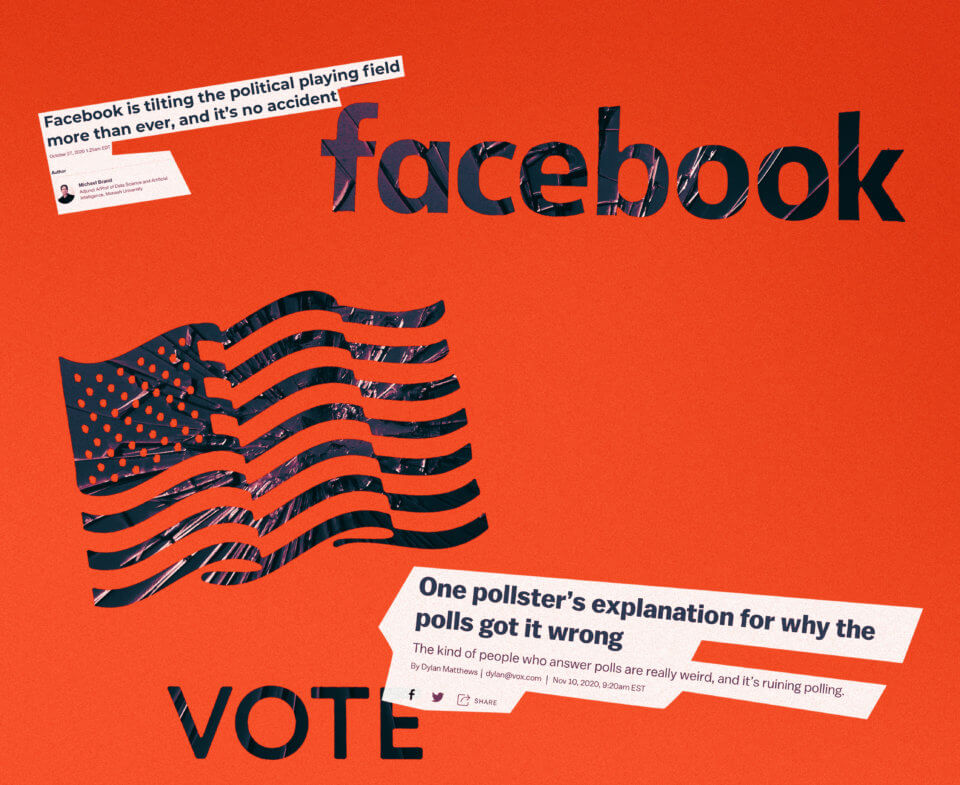
SOCIAL DILEMMAS
Hunter Knifton, Consultant, Toronto
“YOU’RE PROBABLY LESS CONFUSED right now if you spent the last 6 months looking at Facebook than if you spent it looking at polls,” tweeted New York Times tech columnist Kevin Roose on election night at 3:10 a.m. ET, expressing the bewilderment that millions felt as election results trickled in.
While many polling companies have rushed to their own defence to explain the gap between their projections and the final results, one thing is clear: a different story was being told on Facebook, and political parties, businesses and other entities that rely on understanding public opinion are remiss to ignore it.
“Facebook has been the dominant social media platform for years now. But the U.S. election results provide a jarring reminder of how removed our traditional media operators and pollsters still are from the story on this channel.”
While a narrow sector of journalists, consultants and other educated readers may have removed Facebook from their daily schedule, it is still by far the most widely used social media platform in Canada, the United States and worldwide. Importantly, it’s a platform where provocative conservative voices like evangelical Christian Franklin Graham, President Donald Trump and media commentator Ben Shapiro dominate the conversation.
Facebook is hosting an influential and far-reaching conversation, and organizations that care about public opinion would be imprudent to ignore it. But if engagement on the largest social media site skews conservative, why did the polls skew liberal? Consider the following explanations:
- Individuals participating in polls do not know their preferences as well as we assume; or
- Pollsters, political forecasters and mainstream media still have not learned how to account for these audiences that are vocal on Facebook but are less willing to participate in an interview or poll.
The first explanation, in which a survey respondent says Biden is their preferred candidate, but then votes for Trump, is already being addressed by companies and political campaigns. Smart organizations have recognized the disconnect that often exists between an individual’s stated preference and their revealed preference, and are opting for research methods that produce a voter’s true leaning, such as A/B testing advertisements.
The second explanation has potentially much larger implications as organizations are realizing that the data they have always relied upon is not only insufficient, it is unreliable. As such, they must expand their research methods to fully understand public sentiment. A political forecaster properly using Facebook engagement as a variable in their election model would have been successful in 2020, a fact that should be kept in mind for businesses trying to predict public opinion and consumer behaviours. This election showed that organizations must leverage new sources of data to accurately predict and reflect what people are thinking.
Finally, media organizations will likely follow suit as they think about ways to identify and amplify these previously under-reported-on audiences and perspectives. This creates opportunities and threats for organizations that are revered or abhorred by these right-wing groups, as these groups are in the spotlight and will likely drive mainstream media conversation more substantially than ever before.
Facebook has been the dominant social media platform for years now. But the U.S. election results provide a jarring reminder of how removed our traditional media operators and pollsters still are from the story on this channel. On both sides of the border, the next four years will be a race to catch up or be left behind, to be part of the conversation or excluded from it.






